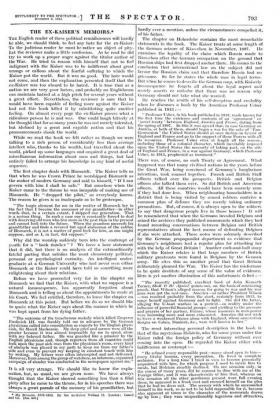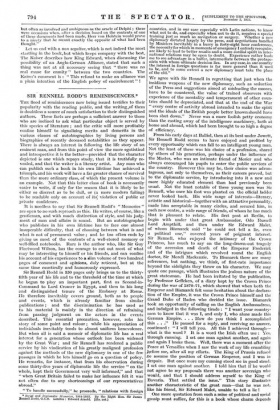THE EX-KAISER'S MEMOIRS.*
TnE English reader of these political reminiscences will hardly be able, we should think, to feel any hate for the ex-Kaiser. To the judicious reader he must be rather an object of pity. Let the reviewer make a little confession. As he read he did try to work up a _proper anger against the titular author of the War. He tried to reason with himself that not to feel indignant with the Kaiser was to be indifferent about great wrongs or callous about the fearful suffering to which the Kaiser put the world. But it was no good. The hate would not come, and then the explanation presented itself that the ex-Kaiser was too absurd to be hated. It is true that as a nation we are very poor haters, and probably no Englishman can maintain hatred at a high pitch for several years without a great effort. Nevertheless, the reviewer is sure that he would have been capable of feeling more against the Kaiser had not this book killed it by substituting quite another feeling. On almost every page the ex-Kaiser proves what a ridiculous person he is and was. One could laugh bitterly at the thought that for so many years he was not merely tolerated, but idolized by a great and capable nation and that his pronouncements shook the world.
While we read the book we felt rather as though we were talking to a rich person of considerably less than average intellect who, thanks to his wealth, had travelled about the world, picked up some languages and acquired a great deal of miscellaneous information about men and things, but had entirely failed to arrange his knowledge in any kind of useful sequence.
The first chapter deals with Bismarck. The Kaiser tells us that when he was Crown Prince he worshipped Bismarck as the maker of modern Germany and said to himself, "If I can govern with him I shall be safe." But somehow when the Kaiser came to the throne he was incapable of making use of Bismarck. He "dropped the pilot," as everybody knows. The reason he gives is so inadequate as to be grotesque.
"The tragic element for me in the matter of Bismarck lay in the fact that I became the successor of my grandfather—in other words that, to a certain extent, I skipped one generation. That is a serious thing. In such a case one is constantly forced to deal with deserving old men who live more in the past than in the present and cannot look into the future. When the grandson succeeds his grandfather and finds a revered but aged statesman of the calibre of Bismarck, it is not a matter of good luck for him, as one might suppose, and as I, in fact, did suppose."
Why did the worship suddenly turn into the contempt of youth for a "back dumber " ? We have a bare statement that it did, but there is no analysis of the extraordinarily fateful parting that satisfies the most elementary political, personal or psychological curiosity. An intelligent under- graduate at a German University who had never seen either Bismarck or the Kaiser could have told us something more enlightening about their relations.
Before we have proceeded very far in the chapter on Bismarck we find that the Kaiser, with what we suppose is a natural inconsequence, has apparently forgotten about Bismarck and is telling us about the appointments he made at his Court. We feel entitled, therefore, to leave the chapter on Bismarck at this point. But before we do so we should like to quote what the Kaiser says about the manner in which he was kept apart from his dying father.
"The outcome of the treacherous malady which killed Emperor Frederick III. was frankly told me in advance by the German physicians called into consultation as experts by the English physi- cian, Sir Morell Mackenzie. My. deep grief and sorrow were all the greater because it was almost Impossible for me to speak alone with my beloved father. He was guarded like a prisoner by the English physicians and, though reporters from all countries could look upon the poor sick man from the physician's room, every kind of obstacle was placed in my path to keep me from my father's side and even to prevent my keeping in constant touch with him by writing. My letters were often intercepted and not delivered. Moreover, from among the group of watchers, an infamous, organized campaign of slander was conducted in the newspapers against me."
It is all very strange. We should like to know the expla- nation, but, as usual, we are given none. We have always thought that the Kaiser showed something less than a filial piety after he came to the throne, for in his speeches there was always a great parade of the memory of his grandfather, but
• My Memoirs, 1878-1918. By the ex-Kaiser \Villain II. London: Cassell and Co. (26s. net.] hardly ever a mention, unless the circumstances compelled it, of his father.
The chapter on Hohenlohe contains the most remarkable statements in the book. The Kaiser treats at some length of the German seizure of Kiao-chou in November, 1897. He examines the legality of the claim which Russia made to Kiao-chou after the German occupation on the ground that Russian ships had first dropped anchor there. He comes to the conclusion that international law on the subject did not
favour the Russian claim and that therefore Russia had no grievance. So far he states the whole case in legal terms. But when he comes to describe the German coup, with Kaiserly inconsequence he forgets all about the legal aspect and merely asserts ex cathedra that there was no reason why Germany should not take what she wanted.
lie reaches the zenith of his self-deception and credulity when he discusses a book by the American Professor Usher published in 1913 :—
"Professor Usher, in his book published in 1913, made known for the first time the existence and contents of an ' agreement ' or 'secret treaty' between England, America and France, dating from the spring of 1897. In this it was agreed that, in case Germany or Austria, or both of them, should begin a war for the sake of ' Pan- Germanism ' the United States should at once declare in favour of England and France and go to the support of these Powers with all its resources. Professor Usher cites at length all the reasons, including those of a colonial character, which inevitably imposed upon the United States the necessity of taking part, on the side of England and France, in a war against Germany, which Professor Usher, in 1913, prophesied as imminent."
There was, of course, no such Treaty or Agreement. What happened was that many civilized nations in the years before the Great War, being convinced of Germany's burglarious
intentions, took counsel together. French and British Staff officers talked over the prospects. British and Belgian officers also talked them over. So did British and American officers. All these countries would have been scarcely sane if they had done less. When neighbouring householders in a district that is being visited by armed robbers contrive a common plan of defence they arc merely taking ordinary precautions. But, of course, it is always open to the robbers to say that dangerous people live in those houses I It will be remembered that when the Germans invaded Belgium and seized the archives they published memoranda which they had found recording conversations between Belgian and British representatives about the best means of defending Belgium if she were attacked. These notes were solemnly described
by the German propagandist department as evidence that Germany's neighbours- had a regular plan for attacking her with the help of Great Britain 1 Another cock-and-bull story which the Kaiser relates is that large numbers of British military greatcoats were found in Belgium by the German army. He cites this as another proof that Great Britain deliberately planned the War. The Kaiser has the misfortune
to be quite destitute of any sense of the value of evidence. Here is yet another illustration of this unfortunate defect :—
"The recently published, excellent book of John Kenneth Turner, Shall It Bc Again? points out, on the basis of convincing proofs, that Wilson's alleged reasons for going to war and his war aims were not the real ones. America—or rather President Wilson —was resolved probably from the start, certainly from 1915, to range herself against Germany and to fight. She did the latter, alleging the U-boat warfare as a pretext—in reality under the influence of powerful financial groups—and yielding to the pressure and prayers of her partner, France, whose resources in man-power were becoming more and more exhausted. America did not wish to leave a weakened France alone with England, whose annexation designs on Calais, Dunkirk, &c., were well known to her."
The most interesting personal description in the book is that of the mysterious Holstein, who for some years under the
Kaiser ruled the foreign policy of Germany without ever coming into the open. He regarded the Kaiser either with indifference or contempt :—
" He refused every responsible post—many stood open to him— every titular honour, every promotion. He lived in complete seclusion. For a long time I tried in vain to become personally acquainted with him, for which purpose I used to invite him to meals, but Holstein steadily declined. On one occasion only, in the course of many years, did he consent to dine with me at the Foreign Office, and it was characteristic of him that, whereas on this occasion all the other gentlemen present wore full evening dress, he appeared in a frock coat and excused himself on the plea that he had no dress suit. The secrecy with which he surrounded himself in his work, so as not to be held responsible for it. became also apparent at times in the character of the memorials drawn up by him, they were unquestionably ingenious and attractive. but often as involved and ambiguous as the oracle of Delphi ; there were occasions when, after a decision based on the contents of one of these documents had been made, Herr von Holstein would prove to a nicety that he meant exactly the opposite of what had been thought."
Let us end with a non sequitur, which is not indeed the most startling in the book, but which keeps company with the best. The Kaiser describes how King Edward, when discussing the
possibility of an Anglo-German Alliance, stated that such a thing was not at all necessary seeing that "there was no real cause for enmity" between the two countries. The Kaiser's comment is : "This refusal to make an alliance was a plain intention of the English policy of encirclement" I







































































 Previous page
Previous page